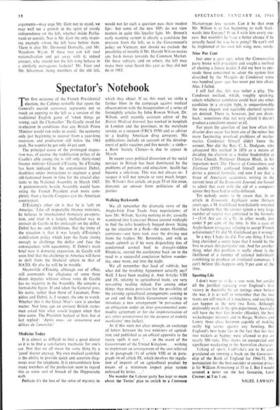Spectator's Notebook
THE first outcome of the French Presidential election, the Cabinet reshuffle that opens the General's second septennat, represents not so much an opening to the left as a version of the traditional English game of 'when things go wrong, sack the Chancellor. De Gaulle stood for re-election in conditions that any British Prime Minister would run miles to avoid: the economy only just beginning to recover from a year-long recession, and production still below the 1964 peak. No wonder he got only 44 per cent.
The principal cause of the prolonged stagna- tion was, of course, the stabilisation policy of de Gaulle's able young (he is still only thirty-nine) finance minister Giscard d'Estaing. So d'Estaing has been replaced by the expansionist Debre, doubtless under instructions to engineer a good old-fashioned boom in time for the crucial elec- tions to the National Assembly in March 1967. A predominantly hostile Assembly would ham- string the French President even more com- pletely than a hostile Congress can his American counterpart.
D'Estaing's other sin is that he is 'soft on America.' Like all respectable finance ministers, he believes in international monetary co-opera- tion, and tried in a largely ineffectual way to restrain de Gaulle in his onslaught on the dollar. Debit has no such inhibitions. But the irony of the situation is that it was largely d'Estaing's stabilisation policy which kept the franc strong enough to challenge the dollar and face the consequences with equanimity. If Debre's main brief now is domestic expansion. de Gaulle will soon find that the challenge to America will have to shift from the financial sphere to that of NATO. Or else he will be in trouble.
Meanwhile d'Estaing, although out of office, still commands the allegiance of some three dozen deputies without whose votes de Gaulle has no majority in the Assembly. He remains a formidable figure. If and when the General goes, his name, rather than those of Lecanuet, Pom- pidou and Debre, is, I suspect, the one to watch. Whether this is the Great Man's view is another matter. Not long ago an eminent British states- man asked him what would happen when that time came. The President hedged at first, but at last replied : 'A pres nous, on retournera aux &Wes de tanarchie.'


































 Previous page
Previous page